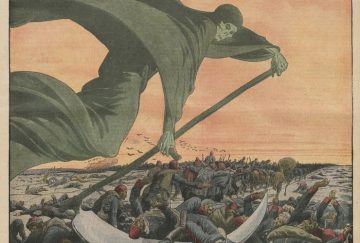 Alex de Waal in Boston Review:
Alex de Waal in Boston Review:
There is a saying among epidemiologists: “If you’ve seen one pandemic, you’ve seen one pandemic.” Echoing this trade wisdom in an interview two weeks ago, Bruce Aylward, the assistant director of the World Health Organization (WHO), pointed out that each new pandemic follows its own logic, and those who rely on past experiences to draw conclusions for public health will make mistakes. With each new pandemic it is tempting to scour history books for parallels and lessons learned. But as many have stressed, the wisdom to be gained is often greatly exaggerated.
Still, it is possible to steer a course between the Scylla of historical blindness and the Charybdis of hasty generalization. In her book about the era of the Black Death of 1348, A Distant Mirror (1978), the historian Barbara Tuchman confines her remarks on the present to a few oblique lines in the preface. “If one insists upon a lesson from history,” she writes, it is, as the French medievalist Edouard Perroy contended, that “Certain ways of behavior, certain reactions against fate, throw mutual light upon each other.” My working premise is that although the pathogen may be new, the logic of social response is not, and it is here that we can see historical continuities. An especially telling case study—still an object of fascination and controversy among historians of health and disease—is the devastating outbreak of cholera in Hamburg at the end of the nineteenth century, the subject of Richard Evans’s superbly researched book, Death in Hamburg (1987).
More here.
